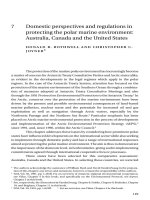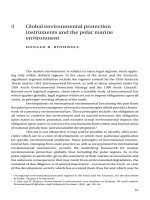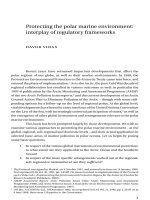Cambridge.University.Press.Protecting.the.Polar.Marine.Environment.Law.and.Policy.for.Pollution.Prevention.Jan.2001.pdf
Bạn đang xem bản rút gọn của tài liệu. Xem và tải ngay bản đầy đủ của tài liệu tại đây (1.36 MB, 300 trang )
This page intentionally left blank
Protecting the polar marine environment
How can we best protect the polar marine environment against pollu-
tion? Leading scholars on environmental law, the law of the sea, and
Arctic and Antarctic affairs examine this important question. To what
extent do existing global instruments of environmental protection apply
to the Arctic Ocean and the Southern Ocean? Can the arrangements
adopted at regional, sub-regional and national levels provide adequate
protection? This book examines and compares various levels of regula-
tion in protecting the marine environment of the Arctic and Antarctic,
with specific attention to land-based activities, radioactive waste
dumping, and shipping in ice-covered waters. Recent developments
since the establishment of the Arctic Council in 1996 and the entry into
force of the Protocol on Environmental Protection to the Antarctic Treaty
in 1998 are also discussed. This is a volume that will appeal to polar spe-
cialists and to all those interested in environmental law and policy.
is Director of the Polar Programme at the Fridtjof Nansen
Institute in Norway, and a Senior Research Fellow at the Institute. His
recent books include Governing the Antarctic: The Effectiveness and
Legitimacy of the Antarctic Treaty System (with O. S. Stokke, 1996), Arctic
Development and Environmental Challenges (1997), Order for the Oceans
at the Turn of the Century (with W. Østreng, 1999) and Implementing the
Environmental Protection Regime for the Antarctic (2000).
Protecting the polar
marine environment
LAW AND POLICY FOR
POLLUTION PREVENTION
Edited by
DAVOR VIDAS
The Pitt Building, Trumpington Street, Cambridge, United Kingdom
The Edinburgh Building, Cambridge CB2 2RU, UK
40 West 20th Street, New York, NY 10011-4211, USA
477 Williamstown Road, Port Melbourne, VIC 3207, Australia
Ruiz de Alarcón 13, 28014 Madrid, Spain
Dock House, The Waterfront, Cape Town 8001, South Africa
First published in printed format
ISBN 0-521-66311-3 hardback
ISBN 0-511-03390-7 eBook
The Fridt
jof Nansen Instutute 2004
2000
(Adobe Reader)
©
,
Contents
List of figuresxi
List of tablesxii
Notes on the contributorsxiii
Preface and acknowledgementsxv
List of abbreviationsxviii
Protecting the polar marine environment: interplay of
regulatoryframeworks3
Davor Vidas
Areas dealt with in this book4
The Arctic and Antarctic regions: similarities and contrasts5
Structure of this book: interplay of regulatory frameworks13
:
1 Globalism and regionalism in the protection of the marine
environment19
Alan Boyle
Globalism and regionalism in the law of the sea20
What is a ‘region’?26
Advantages and disadvantages of regionalism30
Conclusions33
2 United Nations Convention on the Law of the Sea and the polar
marineenvironment34
Budislav Vukas
vii
Applicability of the LOS Convention to the polar oceans35
Navigation and the protection of the marine environment38
Enclosed or semi-enclosed seas: Part IX39
Protection and preservation of the marine environment:
Part XII42
Part XII and customary international law45
Part XII and the polar oceans51
Settlement of disputes: Part XV53
Final remarks54
3 Global environmental protection instruments and the polar
marineenvironment57
Donald R. Rothwell
Marine pollution conventions and the polar oceans58
International regulation of ship-sourced pollution59
International regulation of dumping at sea63
International regulation of land-based pollution65
International regulation of maritime emergencies67
Marine environmental protected areas70
Other global environmental conventions and their impact on
the polar marine environment73
Interaction between global conventions and regional regimes
for marine environmental protection75
Conclusions76
4The polar marine environment in regional cooperation78
Davor Vidas
International cooperative processes for polar environmental
protection: the decade of change79
Approaches to polar marine environmental protection in
regional cooperation88
Conclusions: a paradox of similarities or a consequence of
differences?101
5 Protection of the Antarctic environment against marine pollution
under the 1991 Protocol104
Christopher C. Joyner
Marine pollution in the Antarctic105
Marine pollution law in the 1991 Environmental Protocol107
The annexes112
The balance sheet122
viii Contents
6 Sub-regional cooperation and protection of the Arctic marine
environment:the Barents Sea124
Olav Schram Stokke
Sub-regional collaboration in the Barents Region: effectiveness
concerns125
Threats to the Barents Sea marine environment130
Managing the marine environment: sub-regional contributions134
Conclusions: effectiveness of sub-regional cooperation in the
Barents Sea146
7 Domestic perspectives and regulations in protecting the polar
marineenvironment:Australia,Canada and the United States149
Donald R. Rothwell and Christopher C. Joyner
Canada and the Arctic marine environment150
The United States and the Arctic marine environment156
Australia and the Antarctic marine environment161
The United States and the Antarctic marine environment166
Polar states and marine environmental protection: conclusions170
:
8 Land-based marine pollution and the Arctic: polarities between
principles and practice175
David VanderZwaag
Crises in Arctic seas177
Global instruments addressing land-based marine pollution180
Extra-regional efforts addressing land-based pollution184
Regional sea agreements relevant to land-based pollution of
the Arctic187
Arctic regional initiatives addressing land-based
pollution and activities189
Challenges and future directions195
9 Radioactive waste in the Barents and Kara Seas: Russian
implementation of the global dumping regime200
Olav Schram Stokke
The problem of radioactive waste201
The global dumping regime203
Implementing the dumping regime: the Russian case207
Conclusions218
Contents ix
10 Regulation of navigation and vessel-source pollution in the
NorthernSea Route:Article 234 and state practice221
R. Douglas Brubaker
The Northern Sea Route: legal controversy223
Russian regulation: non-compliance with, or interpretation of,
Article 234?225
Practice of the USA and other states in Russian Arctic waters239
Conclusions242
11 The emerging International Polar Navigation Code: bi-polar
relevance?244
Lawson W. Brigham
Navigating in polar waters244
Historical perspectives246
The harmonisation process and developments248
Key elements of the Polar Code250
Arctic issues254
Antarctic issues256
Assessing the potentials of the Polar Code259
Conclusions and the future261
Index of international instruments and national legislation263
Subject index268
x Contents
List of figures
10.1 The Northern Sea Route page 222
11.1 Extent of sea ice in the polar oceans 247
xi
List of tables
11.1 Structure and components of the draft Polar Code as page 252
submitted to the IMO, March 1998
xii
Notes on the contributors
Alan Boyle is Professor of Public International Law at the University of Edinburgh.
He is General Editor of the International and Comparative Law Quarterly and co-
author, with P. Birnie, of International Law and the Environment (1993). Among
his many publications are the recent edited volumes, The International Law
Commission and the F
uture of International Law
(with M. Anderson, A.
V. Lowe and
C. Wickremasinghe, 1998) and International Law and Sustainable Development
(with D. Freestone, 1999).
Lawson Brigham is a researcher at the Scott Polar Research Institute, University of
Cambridge. A US Coast Guard officer 1970–95, he has sailed on all oceans and was
captain of the icebreaker Polar Sea on Arctic and Antarctic expeditions, including
a 1994 scientific crossing of the Arctic Ocean. Captain Brigham has published
widely on polar science, ice navigation and the Northern Sea Route, including edi-
torship of the book, The Soviet Maritime Arctic (1991).
Douglas Brubaker is Senior Research Fellow at the Fridtjof Nansen Institute, where
he was coordinator of the project on Legal, Political and Security Aspects within the
International Northern Sea Route Programme (INSROP, 1993–8). He is the author
of Marine Pollution and International Law: Principles and Practice (1993) and is
currently preparing a monograph on Russian Arctic waters in international law.
Christopher Joyner is Professor of Government and International Law at
Georgetown University, Washington, DC. He is the author or editor of numerous
publications addressing various issues of international affairs and international
law. An expert on Antarctic politics and law, his recent books include Governing the
Frozen Commons: The Antarctic Regime and Environmental Protection (1998) and
Eagle Over the Ice: US Foreign Policy and Antarctica (co-authored with E. Theis,
1997).
Donald Rothwell is Associate Professor at the University of Sydney Faculty of
Law. He is also acting director of the Australian Centre for Environmental Law, and
has published widely on environmental law, as well as on Arctic and Antarctic
xiii
law, including Polar Regions in International Law (1996) and, with R. Davis,
Antarctic Environmental Protection: A Collection of Australian and International
Instruments (1997).
Olav Schram Stokke is Research Director at the Fridtjof Nansen Institute. He has
written extensively on international institutions and regime theory, especially on
the effectiveness and implementation of regional cooperation in resource man-
agement and environmental protection. He is co-editor of Governing the Antarctic:
The Effectiveness and Legitimacy of the Antarctic Treaty System (with D. Vidas, 1996)
and The Barents Region: Cooperation in Arctic Europe (with O. Tunander, 1994).
David VanderZwaag is Professor of Law at Dalhousie University, Nova Scotia, and
former co-director of that university’s Marine Affairs Program. An Associate with
the Oceans Institute of Canada, he has published widely on ocean and environ-
mental law and policy, including Canada and Marine Environmental Protection
(1995) and Oceans Law and Policy in the Post-UNCED Era: Australian and
Canadian Perspectives (co-editor, 1996).
DavorVidas is Director of the Polar Programme at the Fridtjof NansenInstitute. He
has been member/adviser to the Norwegian delegation to Antarctic Treatymeet-
ings since 1992. His books address both Antarctic and
Arctic a
ffairs, law of the sea
and environmental law, including most recently Order for the Oceans at the Turn of
the Century (co-edited withW. Østreng,1999) and Implementing the Environmental
Protection Regime for the Antarctic (2000).
Budislav Vukas is Professor of Public International Law at the University of Zagreb
Faculty of Law, and Judge at the International Tribunal for the Law of the Sea. A
member of the Institut de Droit international, Professor Vukas has made substan-
tial contributions to various fields of international law, including the law of the sea,
environmental law and human rights. Among his many publication activities is the
editorship of the five-volume series Essays on the New Law of the Sea (1985–96).
xiv Notes on the contributors
Preface and acknowledgements
This book represents part of the final outcome of a three-year interna-
tional research project, ‘Polar Oceans and the Law of the Sea’ (POLOS, 1996–8).
1
The POLOS project, which was directed by the editor of this book, sought to analyse
global and regional solutions in the law of the sea and ocean policy as these relate
to the Arctic Ocean and the Southern Ocean.
In addition to the Fridtjof Nansen Institute – which initiated the POLOS
project in 1995 and coordinated it until its finalisation in December 1998 – experts
from four continents participated in this project. Here it should be stated that, for
those officials who took part in the project, their participation and the views
expressed are in their personal capacity only.
This book has been written by a group of nine contributors, all promi-
nent experts in their respective fields, from scholarly institutions located in six
countries: Australia, Canada, Croatia, Norway, the United Kingdom and the
United States.
In the course of the POLOS project, the research team met once each year
for project workshops, where various drafts for the book’s chapters were discussed.
Along with acknowledging the contributions made by participants in the project, a
special acknowledgement is also due to the institutions which provided venues for
the workshops: in 1998, the Inter-University Centre in Dubrovnik, Croatia; in 1997,
the Fridtjof Nansen Institute at Polhøgda near Oslo, Norway; and in 1996, the
Antarctic Cooperative Research Centre at the University of Tasmania in Hobart,
Australia. In connection with these arrangements, I especially wish to extend my
gratitude to several persons who provided hospitality and organisational help: for
the 1998 workshop, hvala to Berta Dragicˇevic´, Srec´ko Krzˇic´ and Dubravka
Kapetanic´; for the 1997 workshop, takk to Jan Magne Markussen, and to Willy and
Sonja Østreng; and for the 1996 workshop, thanks to Bruce and Rosalie Davis, and
to Richard and Twila Herr. Moreover, on the occasion of the 1996 workshop held in
xv
1
Another book, titled Governing High Seas Fisheries: The Interplay of Global and Regional Regimes
and edited by Olav Schram Stokke, is forthcoming by the Oxford University Press.
Hobart, His Excellency the Governor of Tasmania Sir Guy Green hosted a seminar
on the polar oceans and law of the sea, attended by the project research team and
several leading Australian/Tasmanian policy-makers and experts on Antarctic
affairs. In connection with this arrangement, Sir Guy honoured the project team
with his kind hospitality at Government House; and so did, jointly, the Minister and
Shadow Minister for Antarctic Affairs of Tasmania, the Honourable Peter Hodgman
and the Honourable John White at Parliament House.
A great many experts, scholars and decision-makers alike, have gener-
ously offered comments and advice on various parts of the manuscript. While it
is not possible to single out all of them here, I wish in particular to thank William
Bush, Robin Churchill, Edgar Gold, F
ranklyn Gri
ffiths, Alex Oude Elferink and
Ashley Roach, as well as two anonymous reviewers of Cambridge University
Press who provided very useful comments on the draft manuscript submitted in
1998.
Appreciation and thanks are due also to the publisher, especially to Finola
O’Sullivan, Commissioning Editor for Law at Cambridge University Press, for her
professional assistance in various phases which led towards the production of this
book, and not least for her patience and understanding in the final phase of man-
uscript completion.
Similarly, I wish to express my gratitude to Egil Nansen, grandson of
Fridtjof Nansen, for permission to use the drawing by Fridtjof Nansen on the cover
of the book, showing the polar vessel Fram, which was used in some of the most
famous expeditions in both the Arctic and Antarctic.
My special thanks also go to Susan Høivik, who undertook the language
editing of the manuscript in her superb way, as always.
I wish to acknowledge the invaluable assistance and support received
from my colleagues at the Fridtjof Nansen Institute, in particular Olav Schram
Stokke, for his never-ending energy and enthusiasm in reading and commenting
on draft after draft of various chapters through all the project years, and for his
unfailing ability to provide lucid comments; Anne Berteig, for her careful and con-
scientious copy-editing of the manuscript; Kari Lorentz
en, for invaluable biblio-
graphical assistance; Claes Ragner Lykke, for cartographic assistance; Maryanne
Rygg and Ivar Liseter, for various formatting assistance; and Snorre Fjelstad, for
technical assistance in organising the 1997 project workshop.
And, finally, I wish to extend sincere thanks and appreciation to my dear
friend Willy Østreng, for many years the director of the Fridtjof Nansen Institute,
without whose vision and support the initiation of the POLOS project and, ulti-
mately, this book would hardly have been possible.
Funding for the POLOS project and for the editing of this book was pro-
vided by the Research Council of Norway and by the Fridtjof Nansen Institute,
whose support is gratefully acknowledged.
Let me add that none of the above-mentioned individuals or organ-
isations is responsiblefor anyshortcomings of this book.Although the individual
xvi Preface and acknowledgements
authors bear the responsibilityfor own chapters, the editor alone is answerable
for the book as such. If the reader should find satisfaction and enrichment in the
pages that follow, then of course all those concerned deserve a measure of credit.
The book is up to date as of 8 June 1999.
Mosˇc´enicˇka Draga, Croatia, August 1999
Preface and acknowledgements xvii
List of abbreviations
AAT Australian Antarctic Territory
ACOPS Advisory Committee on Protection of the Sea
AEPS Arctic Environmental Protection Strategy (1991)
AFZ Australian Fishing Zone
AMAP Arctic Monitoring and Assessment Programme
AMEC Declaration on Arctic Military Environmental Cooperation
(1996)
ARPA (United States) Arctic Research Policy Act (1984)
ASMA Antarctic Specially Managed Area
ASOC Antarctic and Southern Ocean Coalition
ASPA Antarctic Specially Protected Area
ASPPR (Canadian) Arctic Shipping Pollution Prevention Regulations
(1978, 1991)
ATCM Antarctic Treaty Consultative Meeting
ATS Antarctic Treaty System
AWPPA (Canadian) Arctic Waters Pollution Prevention Act (1970)
AWPPR (Canadian) Arctic Waters Pollution Prevention Regulations
(1978)
Basel Convention Convention on the Control of Transboundary Movements of
Hazardous Wastes and Their Disposal (1989)
BAT best available techniques
BEAR Barents Euro–Arctic Region
BEP best environmental practices
CAGIO Circumpolar Advisory Group on Ice Operations
CCAMLR Convention on the Conservation of Antarctic Marine Living
Resources (1980)
CCAS Convention for the Conservation of Antarctic Seals (1972)
CEE Comprehensive Environmental Evaluation
CEP Committee for Environmental Protection
CFR (United States) Code of Federal Regulations
xviii
CITES Convention on International Trade in Endangered Species of
Wild Fauna and Flora (1973)
CLC International Convention on Civil Liability for Oil Pollution
Damage (1969)
COMNAP Council of Managers of National Antarctic Programmes
CRAMRA Convention on the Regulation of Antarctic Mineral Resource
Activities (1988)
CZMA (United States) Coastal Zone Management Act (1972)
EEZ exclusive economic zone
EIA environmental impact assessment
Environmental Protocol on Environmental Protection to the Antarctic Treaty
Protocol (1991)
EU European Union
FAO Food and Agriculture Organisation
Fund Convention International Convention on the Establishment of an
International Fund for Compensation for Oil Pollution
Damage (1971)
GPA Global Programme of Action for the Protection of the Marine
Environment from Land-Based Activities (1995)
HNS Convention International Convention on Liability and Compensation for
Damage in Connection with the Carriage of Hazardous and
Noxious Substances by Sea (1996)
IACS International Association of Classification Societies
IAEA International Atomic Energy Agency
IAPG Interagency Arctic Policy Group
ICJ International Court of Justice
ICJ Reports International Court of Justice, Reports of Judgments, Advisory
Opinions and Orders
IEE initial environmental evaluation
IGPRAD Inter-Governmental Panel of Experts on Radioactive Waste
Disposal at Sea
ILM International Legal Materials
IMO International Maritime Organisation
INSROP International Northern Sea Route Programme
ITLOS International Tribunal for the Law of the Sea
London Convention for the Prevention of Marine Pollution by
[Dumping] Dumping of Wastes and Other Matter (1972)
Convention
LOS Convention United Nations Convention on the Law of the Sea (1982)
LRTAP Convention on Long-Range Transboundary Air Pollution
(1979)
MARPOL 73/78 International Convention for the Prevention of Pollution from
Ships (1973), as modified by the Protocol of 1978
List of abbreviations xix
MEPC Marine Environmental Protection Committee (of IMO)
MMS (United States) Minerals Management Service
NATO North Atlantic Treaty Organisation
NSF National Science Foundation
NSR Northern Sea Route
NSRA Northern Sea Route Administration
NSR Guide (Russian) Guide to Navigating Through the Northern Sea
Route (1995)
NSR Regulations Regulations for Navigation on the Seaways of the Northern Sea
Route (1990)
OCS outer continental shelf
OCSLA (United States) Outer Continental Shelf Lands Act (1953)
OECD Organisation for Economic Cooperation and Development
OILPOL International Convention for the Prevention of Pollution of the
Sea by Oil (1954)
OPA (United States) Oil Pollution Act (1990)
OPRC International Convention on Oil Pollution Preparedness,
Response and Cooperation (1990)
OSPAR Convention for the Protection of the Marine Environment of
Convention the North-East Atlantic (1992)
OTA (United States) Office of Technology Assessment
OWG Outside Working Group of technical experts (under IMO)
PAME Protection of the Arctic Marine Environment Working Group
PCB polychlorinated biphenyl
Polar Code (Draft) International Code of Safety for Ships in Polar Waters
POP persistent organic pollutant
RPA Regional Programme of Action for the Protection of the Arctic
Marine Environment from Land-Based Activities (1998)
RSNT Revised Single Negotiating Text
SOLAS International Convention for the Safety of Life at Sea (1974)
STCW International Convention on Standards of Training,
Certification and Watchkeeping for Seafarers (1978)
St.meld Stortingsmelding (Norwegian Government Report to the
Storting)
TOVALOP Tanker Owners’ Voluntary Agreement Concerning Liability for
Oil Pollution (1969)
UN United Nations
UNCED United Nations Conference on Environment and
Development (1992)
UNCLOS III Third United Nations Conference on the Law of the Sea
(1973–82)
UN/ECE United Nations Economic Commission for Europe
UNEP United Nations Environment Programme
xx List of abbreviations
UNIDO United Nations Industrial Development Organisation
UNTS United Nations Treaty Series
USAP United States Antarctic Research Program
USC United States Code
USCA United States Code Annotated
List of abbreviations xxi
Introductory overview









